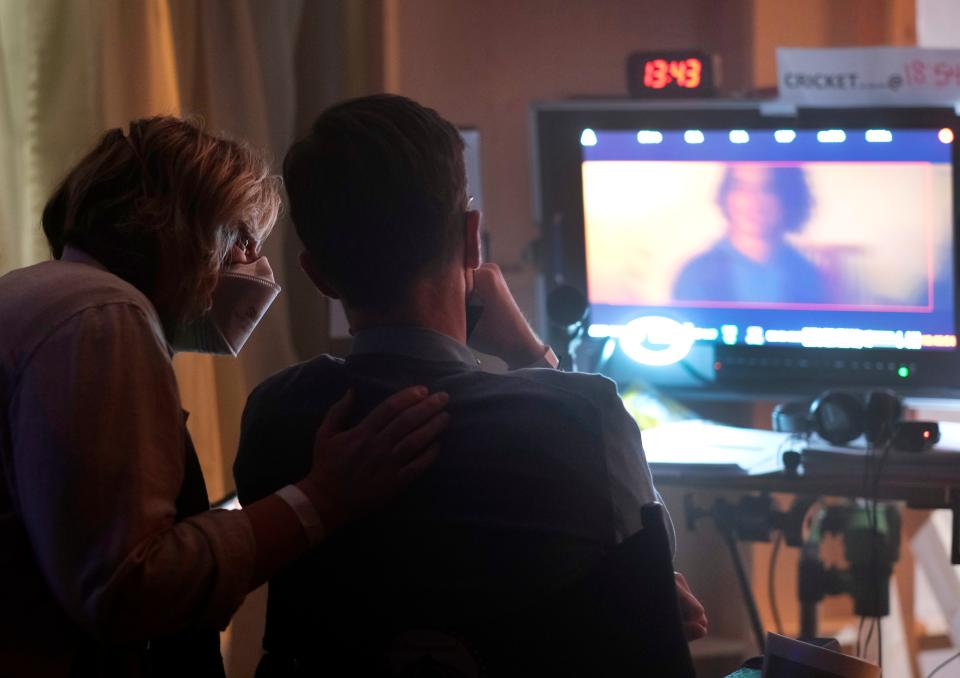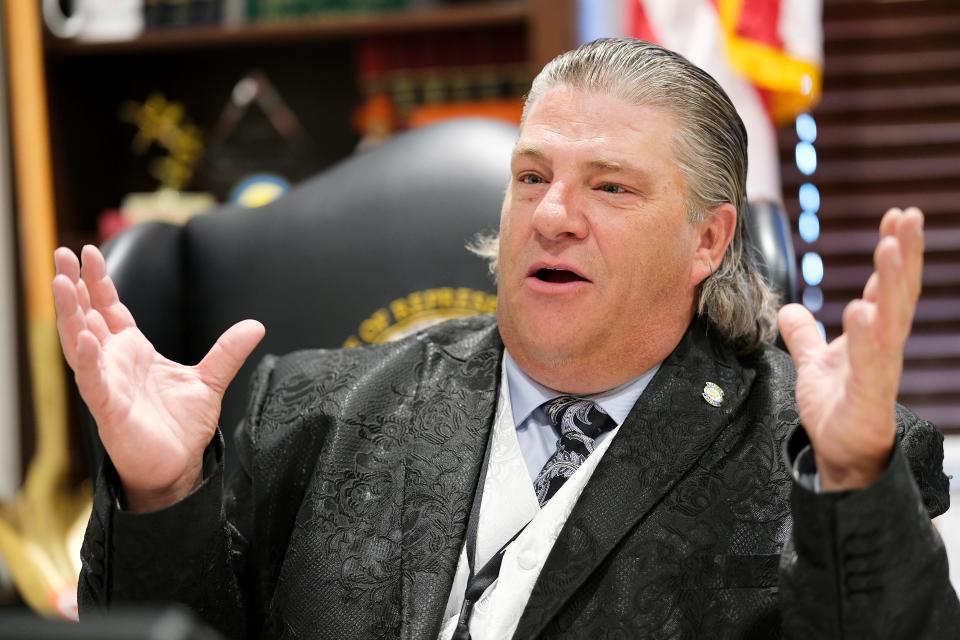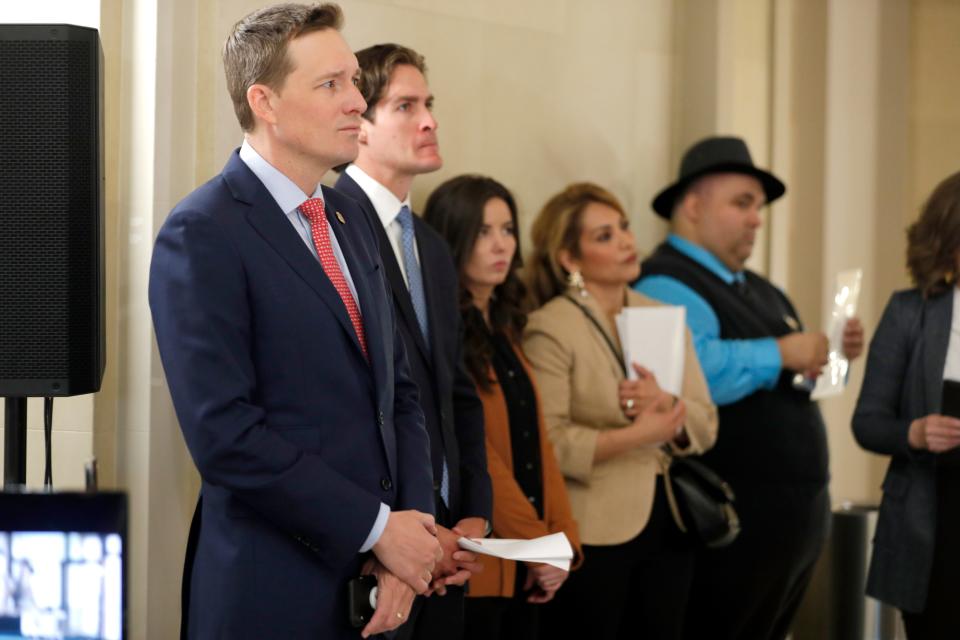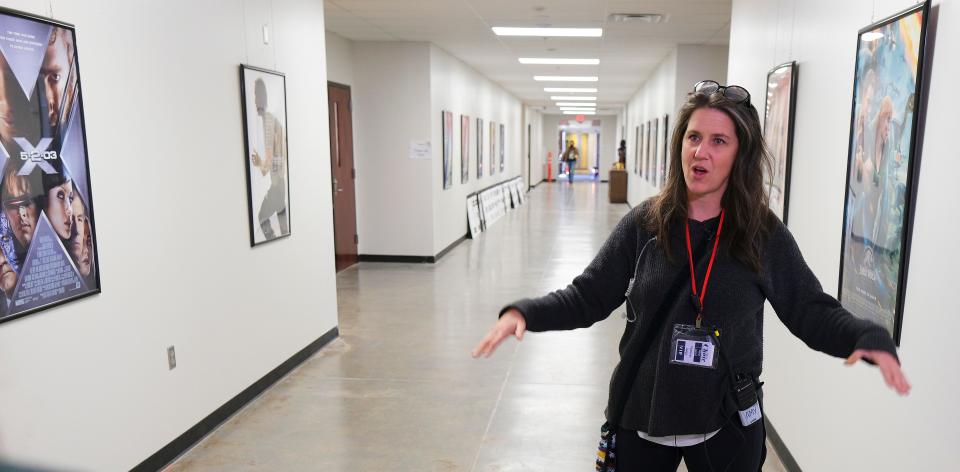Filmed before a live studio audience: Oklahoma Legislature considering new TV incentive
When state Rep. Scott Fetgatter was working on new film incentive legislation to present this session, he found inspiration in country music — or at least in the genre's Tennessee epicenter.
"It's the Nashville approach. Nashville couldn't compete with New York or California in music. So, they took a niche, and they carved it out called country music. And they steal all of our superstar talent out of Oklahoma to come to Nashville and cut records," Fetgatter said.
"So, (we're taking) that kind of approach of, 'Let's carve out a niche that is really middle American ... and make it ours.'"
Fetgatter, R-Okmulgee, co-authored with House Majority Leader Jon Echols, R-Oklahoma City, House Bill 3964, which would establish a new state film incentive specifically for the production of live episodic television. The proposed incentive aims to bring to Oklahoma projects like talk shows, sitcoms and game shows that are filmed before a live studio audience.
From the industry feedback he's received, Fetgatter said he believes the legislation is the first of its kind.

"Over the past couple of years, we've seen kind of a resurgence in sitcoms ... and instead of filming eight or 10 episodes, sitcoms and game shows, live studio audience stuff, they're looking at 100 episodes or 200 episodes, because they're just much more long-term. It'd be a lot more stability for our workforce," said Fetgatter, whose district was the production hub for all three seasons of the celebrated FX streaming series "Reservation Dogs."
"With the resurgence of 'Frasier' and 'Night Court' — and even the youngest generation right now, they're starting to go back and watch sitcoms like 'Friends' — we felt like maybe there's a niche there we would try to carve out and make it ours. So, we could compete and be the best at it in the country."

What happened to HB 1362, which would boost the cap on the current state film incentive?
Before he helped introduce HB 3964, Fetgatter co-authored the Filmed in Oklahoma Act of 2021, which established the current state incentive program, building on the previous Oklahoma film rebate that was capped at $8 million a year.
Last year, he co-authored HB 1362, which would boost the incentive's annual cap set by the Filmed in Oklahoma Act of 2021 from $30 million to $80 million.
In March 2023, the Oklahoma House of Representatives passed HB 1362 by a 72-22 vote, sending it to the state Senate. But the Senate never heard the bill, allowing it to carry over to the current legislative session.
Last fall, the Oklahoma Film + Music Office revealed that the state's film and television industry saw nearly $300 million in qualified expenditures from productions using the state’s film incentive program in fiscal years 2021 and 2022. In that time frame, the Filmed in Oklahoma Act of 2021 also created nearly 12,000 local career opportunities, with close to $120 million in wages paid to Oklahomans.

Still, Lt. Gov. Matt Pinnell said Oklahoma's burgeoning film industry could attract even more business by boosting the annual cap on the state incentive.
"I think last year we turned away over $85 million in projects because we were capped out on the rebate. So, what I continue to talk about in this building and around the state is, listen, I'm glad we have a very lean, well-oiled machine. But it's lean: $30 million is drawing a lot of business to the state of Oklahoma. But we could be doing a whole lot more," Pinnell told The Oklahoman March 25, which was Oklahoma Film and Music Day at the Capitol.
The entertainment industry showcase drew hundreds of people and more than 50 film- and music-related businesses, school programs and organizations from across the state to the Capitol's second-floor rotunda. Along with an array of informational booths, Film and Music Day included a display of costumes and props from Martin Scorsese's $200 million Oscar-nominated historical epic “Killers of the Flower Moon," the biggest movie made in Oklahoma to date.
"We'll have in back-to-back years two of the largest blockbusters in the world. 'Twisters' will be the, I firmly believe, largest blockbuster of the summer, probably this year," Pinnell said, referring to the storm-chasing follow-up to the 1996 hit "Twister," opening July 19 in theaters.
"In a very exciting way, Oklahoma is getting more diversified in our economy, as well."
How has growth in Oklahoma's film industry drawn competition from Texas?
Tulsa-based filmmaker Randy Wayne said he believes that Oklahoma has the chance to be one of the top five U.S. states for making movies and TV, depending on how it grows its film incentives.
"It's all about the rebate: no rebate, no movies. It's a very competitive market in the film rebate world," he said. "Georgia has no cap; everyone can film there all year long. ... Texas' is at $200 million; Arizona's is $200 million. Oklahoma's is $30 million. So, not everyone (here) can get approved, and we see that."
For 17 years, the Moore native lived and worked in Los Angeles, acting in many movies and TV shows. After moving back to Oklahoma six years ago, Wayne and his wife, Talia Bella, founded their production company, Rebellium Films (formerly Thunderbird Films), in 2019.
"We've done 15 features in four and a half years, so that's been nice. (We've made)14 here and one in Texas. We didn't get the rebate on that one, so we went to Texas," he said.
With Oklahoma's growing film industry gaining national attention, several Texas movie stars — including Dennis Quaid, who stars in the long-awaited biopic "Reagan" that filmed primarily in Guthrie, and Glen Powell, who worked across the Sooner State to star in the upcoming "Twisters" — appeared in a campaign last year that took direct aim at Oklahoma while encouraging Texans to support legislation to ramp up the Lone Star State film incentive.
Texas lawmakers voted in June to boost its incentive funding from $45 million to an all-time high of $200 million, according to Variety.

How is HB 3964 designed to take a new approach to help Oklahoma's film industry stay competitive?
Although it's possible that the state Senate could take up HB 1362, Fetgatter expressed doubts that there would be major changes this session to the state film incentive established by the Filmed in Oklahoma Act of 2021.
"It was a $50 million increase to the cap, but I was really struggling getting people to respond to that. There was not an appetite," he said.
"With Texas putting $200 million into their film program, myself and Jon were looking at it and thinking through it — and we cannot compete in Oklahoma by throwing hundreds of millions of dollars into a program. We don't have that kind of money. ... So, we took a different approach, trying to come up with what fits Oklahoma best."
Enter HB 3964, which would set up a revolving fund the state Legislature would put money into for rebates specifically for live studio audience productions.
"They want to make Oklahoma really stand out ... Any episodic (project), obviously, means continued work, continued spend — and that's what you really need to help move the industry forward," said Oklahoma Film + Music Office Director Jeanette Stanton.
"If there's a recording with live audience, you can come and watch ... and we can create more of a tourism effect. And it's still paying jobs for our crews. We'd be the only state to have a bill like this."

Although she was initially mystified by the idea, OKC filmmaker Amy Janes, co-founder of Filmmakers Ranch (formerly Green Pastures Studio), said she hopes HB 3964 will pass.
"We believe that there are some really interesting ways to be able to build Oklahoma's brand through that bill. So, we're trying to stay positive and optimistic," she said. "It is definitely not the norm in the industry — but nothing normal is happening in this industry right now. So, it is a really unique take, and I think Oklahoma could be really well-positioned for it."
In February, HB 3964 passed the House Appropriations and Budget Committee and then the full state House. The Senate Finance Committee passed it March 25, and industry watchers now are waiting for a date on the state Senate floor.
"If you have one or two big movies a year, that gets a lot of the above-the-fold headlines, but it's the episodic shows that provide really year-round jobs ... and a lot of good on-the-job training," Pinnell said. "So, we're really leaning into episodics — and I hope moving into the future as well."
This article originally appeared on Oklahoman: New proposed Oklahoma film incentive focuses on live episodic television
